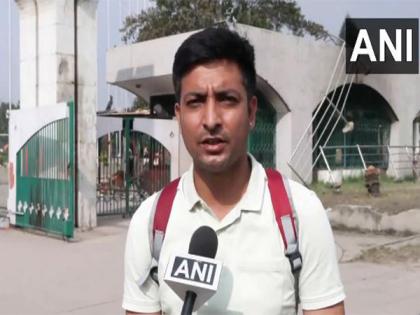"We want youth to be able to do things in their own country": Protestor on Kathmandu unrest
By ANI | Updated: September 10, 2025 18:05 IST2025-09-10T18:04:07+5:302025-09-10T18:05:11+5:30
Kathmandu [Nepal], September 10 : Nepal is witnessing heightened political tension following violent protests that erupted in the Parliament ...

"We want youth to be able to do things in their own country": Protestor on Kathmandu unrest
Kathmandu [Nepal], September 10 : Nepal is witnessing heightened political tension following violent protests that erupted in the Parliament building on September 8, resulting in the structure being set on fire. The unrest came amid demonstrations against the government over alleged corruption.
The political turmoil intensified as the Nepalese Prime Minister resigned on Tuesday, leaving a leadership vacuum at a critical time. Streets across the capital remain tense, with the army deployed to maintain order.
Speaking on the situation, a local resident, Govind, said, "We are here for the cleanliness drive which is going on all over the streets in Kathmandu city, where protests took place yesterday and the day before. I can't say who will be the next Prime Minister of Nepal, but we want someone who is going to do good for the country. The situation is not good as of now. The army has taken over the streets. Balen Shah is one candidate who is more likely to be the Prime Minister of Nepal, as per people's opinion."
The protests Govind referred to, largely led by Gen-Z activists, reflect growing public frustration over governance and corruption. Ahead of the expected meeting between these protesters and President Ram Chandra Poudel, one of them said that while the recent violence might subside, their demand for new rules and stricter regulations against corruption must still be addressed, showing that the street unrest is closely tied to the broader political concerns voiced by citizens.
"The PM of our country, KP Sharma Oli, ran away. We demand a good leader. We will get to know what will happen today (during the expected conversation with the Rashtrapati Bhavan)," Subhash, one of the protesters, toldon Wednesday.
Demanding good leadership from the parties and the administration, the protester said that he hopes that the youth will get more opportunities in the country.
"The violent protests that we had seen for the past two days might not happen now, but we want new rules and regulations in the country. We want the youth to be able to do things in their own country. That is why the Gen-Z protests happened. Now, KP Oli has run away, the corrupt leaders have run away, now we need a new leader," Subhash said.
Two days after violence broke out in Nepal during protests, President Ram Chandra Paudel is expected to meet the protesting citizens today to pursue a peaceful resolution to the ongoing Gen Z movement in the country through dialogue. The call for the talks happened on late Tuesday after the President accepted the resignation of the Prime Minister
Amid these grievances, Nepal's ongoing jobs crisis, with nearly 5,000 young people leaving the country every day to seek work abroad, has added to the unrest.
According to The Himalayan Times, citing an official statement from the President, he called for resolving the crisis without further bloodshed or destruction through dialogue.
"I urge all sides to remain calm, prevent further harm to the nation, and come to the table for talks. In a democracy, the demands raised by citizens can be addressed through dialogue and negotiation," the statement read, as quoted by The Himalayan Times.
The protests began on September 8 in Kathmandu and other major cities, including Pokhara, Butwal, and Birgunj, after the government imposed a ban on major social media platforms, citing tax revenue and cybersecurity concerns.
Protesters are demanding an end to institutionalised corruption and favouritism in governance. They want the government to be more accountable and transparent in its decision-making processes. The protesters are also demanding the revocation of the ban on social media platforms, which they see as an attempt to suppress free speech.
As tensions mounted, the situation quickly escalated on the ground. At least 19 people were killed and 500 were injured in clashes with security forces. A curfew was imposed in several cities, including Kathmandu, to control the situation.
Disclaimer: This post has been auto-published from an agency feed without any modifications to the text and has not been reviewed by an editor
Open in app